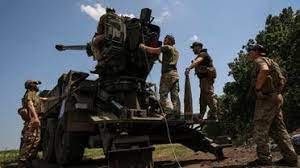WASHINGTON (Agencies): In a significant move, the G7 countries announced a comprehensive plan on Wednesday to provide long-term military aid to Ukraine, symbolising a collective message to Russia that its time for aggression is running out.
President Joe Biden and leaders from the G7 nations, including Britain, Canada, France, Germany, Italy, Japan, and the United States, joined Ukrainian President Volodymyr Zelensky in Vilnius to unveil this crucial initiative.
The plan, according to the White House, represents a united and enduring commitment to bolster Ukraine’s defensive capabilities. Amanda Sloat, the lead White House advisor for European affairs, emphasised that this multilateral declaration will serve as a strong signal to Russia that its window of opportunity is closing.
In response to the Russian invasion that began in February last year, the United States and its allies have been providing temporary military and economic aid to Ukraine. However, considering the potential delay in Ukraine’s NATO membership, the G7 countries view this plan as an interim guarantee of support.
Sloat further explained that the G7 leaders, who convened in Vilnius for the NATO summit, are determined to assist Ukraine in building a formidable military force capable of defending itself and deterring future attacks.
The plan places a significant emphasis on long-term investments in both the military and economic sectors.
While specific details regarding the aid package have not been disclosed, Sloat mentioned that each country will engage in bilateral talks with Ukraine to ensure the practical implementation of the plan.
The G7’s comprehensive plan aims to reassure Ukraine that it will not be abandoned, particularly after NATO reiterated the considerable obstacles that Kyiv faces in its bid to join the alliance.
Sloat highlighted the importance of Ukraine continuing its democratic and security sector reforms, as these remain prerequisites for all members seeking NATO accession.
Drawing comparisons to the long-term military aid provided annually by the United States to Israel, there are concerns about the financial commitments individual governments will make for Ukraine and the challenges of preserving the aid amid domestic political changes.
Sloat expressed optimism that the aid commitments will endure in the long term, demonstrating the unwavering support of the G7 nations for Ukraine’s security and stability.







